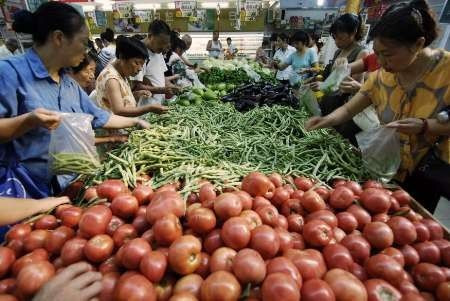Food production remains a challenge in China

Even as food prices shoot up in China, food production remains slow while demand is rising multifold.
Average food prices jumped about 10 percent in October. The Chinese government announced several measures in late November to stem the rise of commodity prices, which in turn affect agricultural production, and stabilizing the supply of products and fertilizers.
China is becoming one of the largest importers of food grains, as its rice crop faces increasing threat from widespread floods. The floods are expected to affect about 20 percent of rice production, according to some reports.
China had not increased its agricultural production as the population grew. Also, a flood in China destroyed much of the agricultural land, and has been called the worst in over a decade.
The Food and Agricultural Organization states that the world's import food bill will be above $1 trillion this year.
The shortage of food grains was further aggravated by the floods in China and Pakistan, as well as a severe drought in Russia, which destroyed much of the crop during the year. This led to massive food price hikes and riots is several parts of the world.
Though the FAO did not term this as a crisis, it called for better and stronger agricultural production and co-operation of countries across the world.
China is intent on controlling rising inflation rates, which touched a 20-year high at 4.4 percent in October. Many fear that the second round of quantitative easing by the U.S. in November could further lead to a rise in inflation.
There are concerns that the People's Bank of China could further tighten monetary policy if inflation does not come down in the next few months.
However, Mark Williams, an economist with Capital Economics, believes that the monetary conditions are not particularly loose in China and markets may be overestimating the degree of tightening to come.
We expect several increases to the required reserve ratio over the next 12 months, but only three benchmark interest rate hikes, he said in a note.
Even though the tightening will continue, it does not have to be particularly sharp as most of the banks are already constrained in their ability to lend, he added.
© Copyright IBTimes 2024. All rights reserved.





















